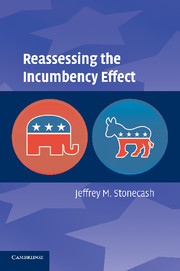Book contents
- Frontmatter
- Contents
- Preface
- Acknowledgments
- PART I AN INCREASED INCUMBENCY EFFECT: RECONSIDERING EVIDENCE
- 1 An Increased Incumbency Effect and American Politics
- 2 The Consensus about a Greater Incumbency Effect
- 3 The Trend in Incumbent Vote Percentages
- 4 Cumulative Career Changes
- 5 The Retirement Slump
- PART II REALIGNMENT AND THE FORTUNES OF (SOME) INCUMBENTS
- PART III APPENDICES: MORE DETAILED ANALYSES OF INCUMBENCY EFFECT INDICATORS
- Bibliography
- Index
5 - The Retirement Slump
Published online by Cambridge University Press: 06 July 2010
- Frontmatter
- Contents
- Preface
- Acknowledgments
- PART I AN INCREASED INCUMBENCY EFFECT: RECONSIDERING EVIDENCE
- 1 An Increased Incumbency Effect and American Politics
- 2 The Consensus about a Greater Incumbency Effect
- 3 The Trend in Incumbent Vote Percentages
- 4 Cumulative Career Changes
- 5 The Retirement Slump
- PART II REALIGNMENT AND THE FORTUNES OF (SOME) INCUMBENTS
- PART III APPENDICES: MORE DETAILED ANALYSES OF INCUMBENCY EFFECT INDICATORS
- Bibliography
- Index
Summary
A final indicator of the possibility of a growing incumbency effect is the retirement slump, or the decline in the partisan vote in a district when an incumbent leaves. If a Republican incumbent received 65 percent in her last election and the Republican candidate in the next election receives 55 percent, then the slump in the Republican percentage is 10 percentage points. This difference is taken as an indication of how much an incumbent was able to boost the vote percentage over what a nonincumbent (the new Republican candidate) would receive. The new vote, without an incumbent present, is taken as the base vote in the district. As noted earlier, numerous studies have found that this retirement slump increased beginning in the 1960s. Figure 5.1 indicates the average retirement slump by decade over the last century for all incumbents who left by 2006.
This evidence indicates that the retirement slump increased significantly beginning in the 1960s. This suggests that incumbents have been able to boost their vote percentages over their careers, as shown in Figure 4.2, resulting in a greater drop in the partisan vote when an incumbent retires.
There are, however, two very significant problems with the indicator. First, it may be biased, excluding many cases of exiting incumbents and picking up primarily the incumbents who were relatively successful. Second, there are reasons to wonder whether it is actually tracking what it purports to measure. Each of these issues deserves attention.
- Type
- Chapter
- Information
- Reassessing the Incumbency Effect , pp. 53 - 64Publisher: Cambridge University PressPrint publication year: 2008



